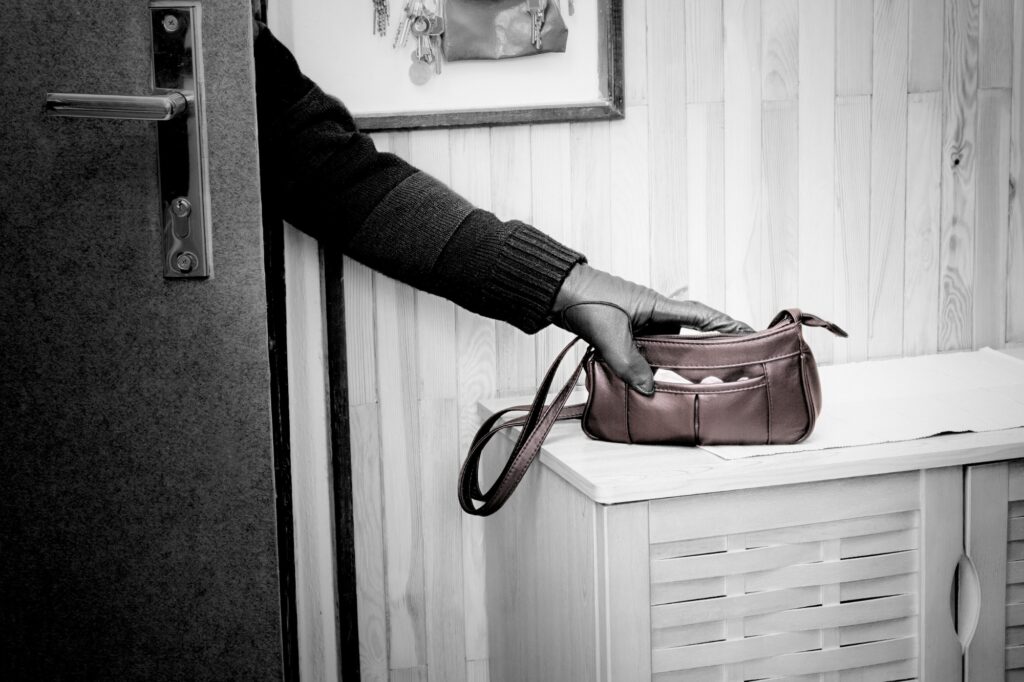The crime of robbery, or Strong Arm Robbery, as it is also called, is a felony offense. According to Florida Statute 812.31, robbery is defined as the act of taking money or property, intentionally and unlawfully, from another person without their permission. When the perpetrator uses force, verbal or physical threats, violence, and assault, they are charged with robbery. Keep in mind that taking property without permission, even for a temporary time, is also considered a robbery.
Robbery can have different variations, such as robbery with a firearm or a deadly weapon or by sudden snatching. Carjacking or a home invasion can also carry a robbery charge. Penalties depend on the specific situation and if you’ve been charged with this felony offense, you absolutely must contact us right now. You’ll need our lawyers’ expertise and extensive experience handling similar cases to work out a proper defense while upholding your rights.
Florida Law Differentiates Larceny and Robbery
The key difference between a theft or larceny and a robbery is the use of force. If the accused uses force or intimidation or even, implies that they can hurt the victim, the crime becomes a robbery. The presence of the victim on the spot also differentiates theft and robbery. The victim may not be aware that they are getting robbed.
Like, for instance, when the perpetrator snatches a bag out of the back of a pickup truck when the owner is sitting in the vehicle. However, if the bag is in an unattended vehicle and the accused snatches it, that’s a theft.
Third Degree Robbery
The lowest type of robbery carrying the minimum penalties is a third degree offense. If the crime has been committed without using any force, violence, or threat, it is considered a third degree offense. Pickpocketing, snatching purses, or grabbing a mobile phone are also examples of third degree robbery.
Second Degree Robbery
If the victim suffers some kind of harm during the robbery, it becomes second degree and more serious category. Perpetrators will also have to face more severe penalties. For example, if the accused pushed the victim when snatching the purse or cell phone, and the victim falls to the ground, the penalties for second degree robbery would apply.
First Degree Robbery
If the perpetrator uses a deadly weapon during the robbery, that is a first degree offense. The weapon could be a firearm or any other capable of inflicting serious harm to the victim. For example, an armed individual walks into a diner and points a gun at the owner. The robber demands money and the owner empties the cash register. The robber escapes with the cash. First degree felony charges apply even if the robber did not actually harm the victim, but only threatened to hurt them.
Penalties for a Robbery in Ocala, Florida
The court orders penalties and punishments according to the particular situation when the crime took place and the value of the property. Florida Statutes follow the 10-20-Life regulation where sentences of 10 years, 20 years, and life imprisonment can be awarded in case of a third degree offense. This is when a firearm or any other destructive weapon is used where the victim believes they can be harmed. Here are the typical penalties:
- Third degree or Aggravated or Armed Robbery – Class D felony carrying a maximum prison term of seven years. If the perpetrator has committed this crime for the first time, the judge may order a probation term.
- Second degree felony carries a penalty of a $10,000 fine and a prison term of 15 years.
- First degree felony is the most serious crime and is punishable with a $10,000 fine along with life imprisonment. Depending on the individual case, the judge may choose to award a 30 years prison term.
Getting a Competent Attorney is Your Best Chance
People make mistakes all the time. What seems like a serious felony offense could be the result of a couple of drinks too many or duress. If you’ve been accused of a robbery, make sure you get the best defense lawyer who can argue the case effectively and present your side of the facts. The attorneys at Smith & Eulo have more than 100 years of experience in dealing with such situations. Rely on them to handle the case competently and get you off with the minimum penalties.
If you or your loved one find themselves in a situation where you are being accused of Robbery? Call us right away at 352 505-9810 to speak with a qualified legal professional or fill out the contact form on this page. We’re available 24/7, we offer free initial consultation and payment plans. In addition to our Ocala office, we have offices in the following cities across the state of Florida:
- Daytona Beach
- Kissimmee
- Melbourne
- Lakeland
- Clearwater
- Orlando
- Fort Myers
- Sanford
- Miami
- Jacksonville
- Fort Lauderdale
- Sarasota
- Tampa
*Additional Orlando Florida & Orange County Legal Resources
